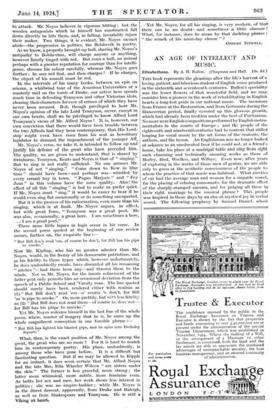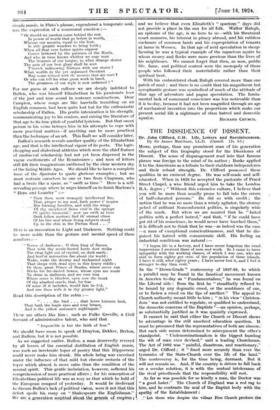AN AGE OF INTELLECT AND Tins book represents the gleanings
after the life's harvest of a loving. patient, and laborious student of English verse produced in the sixteenth and seventeenth centuries. Bullen's speciality, was the lesser flowers of that wonderful field, and we may, consider him a pioneer in the work of rehabilitating in English hearts a long-lost pride in our national music. The invasions from France at the Restoration, and from Germania during the Hanoverian period, finally covered up this glorious growth, which had already been trodden under the heel of Puritanism. No more were English compositions performed by English instru- mentalists in the courts of Europe ; and the people of the eighteenth and nineteenth centuries had to content that stifled longing for vocal music by the art forms of the oratorio, the anthem, and the hymn. An Englishman was no longer looked at askance as an uneducated boor if he could not, at a friend's house, take his place at a madrigal table and sing from sight such charming and technically amazing works as those of Morley, Bird, Weelkes, and Wilbye. Even now, after years of exploring in the works of those men of genius, we are able only to guess at the aesthetic consciousness of the people to whom the practice of that music was habitual. What niceties of ear had the average man and woman for a singable vowel, for the placing of echoing consonants, for the dramatic effect of the sharply-stamped caesura, and for judging all these in' their right marriage to the musical phrase ? This people was inspired in those days by an almost mystical joy in verbal sound. The following prophecy by Samuel Daniel,. whose simule,,Music, in Plato's phrase, engendered a temperate soul, was the- expressiOn Of a communal emotion
should we careless come behind the rest _ In power of words that go before in worth,. _ :Whenas our accents, equal to 'the best, Is able great‘r wonders, to bring forth ; When all that ever hotter spirits exprest Comes bettered by the patience of the North. And who in time knows whither we may vent - -
The treasure of- °Ur' tongue, to what Fktringe- shores The gain of our best glory shall be sent
T'enrich unknowing /srations With our stores ? What "worlds in the yet un.formed Occident - May come refined with th' accents that ire ours ?. Or who can toll for what great work in hand, • The greatness of our style is now ordained ? "
For our guess at such culture we are deeply indebted to Bullen, who was himself Elizabethan in his passionate love of the just and true sound in sentence constructions. Dear Campion, whose songs are like harebells trembling on an English common, had been quite lost but for the enthusiastic scholarship of Bullen. His gentle intoxication is his strength, communicating joy to his readers, and raising the literature of that age to its true pitch of youthful lyricism. But that sweet poison in his veins betrays him in his attempts to cope with more practical matters—if anything can be more practical than-the technique of an art. This fault we will consider later.'
Bullen's research reveals another quality of the Elizabethan age, and that is the intellectual vigour of its poets. The logic- chopping and dialectical athletics which were the chief feature of Mediaeval scholarship had not yet been dispersed in the vague excitements of the Renaissance ; and men of letters still felt their imaginations swiftened by the clear western sky- of the fading Middle Ages. We should like to have a complete issue of the Spectator to quote glorious examples ; but we must restrain ourselves to one or two from Chapman, who had a brain like a spear, as "swift as time." Here is a self- revealing passage where he urges himself on to finish Marlowe's " Het° and Leander" :— "Then thou, most strangely intellectual fire, • That, proper to my soul, hath power t' inspire trttyurningphfaccroudlties,mane dvizitt.sht Thee winrigsngs
Of spirits immortal ! now (as swift as time Doth follow motion) find th' eternal clime Of his free soul whose living subjects stood Up to the chin in the Pierian flood . . ."
Eh rei is an invocation to Light and Darkness. Nothing could be more noble than the gesture and mental speed of _these numbers
"Terror of darkness ; 0 thou king of flames, That with thy music-footed horse .dost strike
" The clear light out of crystal, on dark earth : And hurfst instructive fire about the world : Wake, wake the drowsy and enchanted night That sleeps with dead eyes in this -heavy riddle ; , Or thou, great Prince of Shades, where never sun Sticks his far-darted beams, whose eyes are made
; To shine in, darkness, and see over best
Where sense is blindest, open now the heart Of thy abashed oracle, that, for fear Of some ill it includes, would fain lie hid, And rise thou with it in thy greater light."
Read this description of the robin :—
" . . . the bird . . . that loves humans best, That hath the bugle eyes and rosy breast, , And is the yellow autumn's nightingale."
rlie are others like him ; such as Fulke Greville, a Civil Servant of administrative talent, who said that
"Impossible is but the faith of fear." • We should have room to speak of Drayton, Dekker, Breton, and 13ullein, but it is not possible.
As we suggested earlier. Bullen, a man deservedly revered by all lovers of the essential distillation of English music, was Such- an inveterate toper of poetry that this Hippocrene could never make him drunk. His whole being was exercised under the influence of that mild but chronic ecstasia of the toper which almost is more calm. than the condition of the normal spirit; This gentle -inebriation, however, softened his comprehension of more practical affairs;, for his .conception .of Elizabethan-political life was as rosy as that which he held of the European cesspool of yesterday. It would be "firele.Vanf to discuss Bullen's lack of political vigion, were it not that this defeat spoils his, essay on "Shakespeare the Englishinan." We are a generation_ aceptical_i_bo_ut the _genesis of empires, and we believe that even Elizabeth's " _spacious " days did not provide a place in the sun for all folk. Walter Ralegh, an epitome of the age, is no hero to us—with his theatrical court manners, his interest in piracy abroad, and his ruthless .enclosure of common lands and his expropriation of tenants at home in Wessex. In that age of avid speculation in sheep- farming he was a typical example of the rapacious squire to- whom money and flocks were more precious -than the lives of his neighbours. We cannot forget that then, as now, public life, fame, and political control were the monopoly of those people who followed their materialistic rather than their spiritual bent.
• With his embroidered cloak Ralegh covered more than one patch of mud ; and there is no t;oubt that his magnificent but- sycophantic gesture was symbolical of much of the attitude of that age of adventure and pagan speculation. The funda- mental lack of communal conscience was less noticeable than it is to-day, because it had not been magnified through an age of mechanical invention into the proportions which make our present social life a nightmare of class hatred and domestic











































 Previous page
Previous page